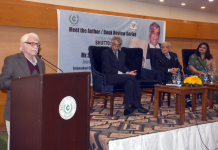From Shamim Shahid
ISLAMABAD, FEB 5: /DNA/ – The UNHCR, the UN Refugee Agency and IOM, the International Organization for Migration, are concerned about recent developments requiring Afghan nationals in Pakistan to relocate from Islamabad Capital Territory (ICT) and Rawalpindi or else face deportation. The two agencies are seeking clarity over the modality and timeframe of this relocation.
While UNHCR and IOM recognise that states may choose to limit freedom of movement for foreigners, including refugees, we jointly urge the Government of Pakistan to implement any relocation measures with due consideration for human rights standards, including due process, and the legal status of Proof of Registration (POR) and Afghan Citizen Card (ACC) holders, who have resided in Pakistan for an extended period of time. The uncertain timeframe to plan for a dignified move is compounding a stressful situation, not to mention the immediate impact of such a move on livelihoods and the education of children.
Since 1 January 2025, an uptick in arrests of Afghan nationals in the ICT and Rawalpindi has caused significant distress, with reports of Afghan nationals of various documentation status being rounded up. More than 800 Afghan nationals, among them women and children, have been deported so far this year from Islamabad and Rawalpindi alone. This latest relocation directive has increased fears of imminent deportation among Afghans in the capital region.
A UNHCR-issued non-return advisory has been in place since 2021, calling for a suspension of forced returns of Afghan nationals from any country regardless of their status. UNHCR and IOM are especially concerned for Afghan nationals who may face a risk of harm upon return, such as ethnic and religious minorities, women and girls, journalists, human rights activists, and members of artistic professions like musicians and others.
“Pakistan has a proud tradition of hosting refugees, saving millions of lives. This generosity is greatly appreciated,” noted UNHCR Representative Philippa Candler. “Forced return to Afghanistan could place some people at increased risk. We urge Pakistan to continue to provide safety to Afghans at risk, irrespective of their documentation status.”
UNHCR and IOM understand the challenges the Pakistan Government has been facing, in particular those related to security. Refugees, like all others, have obligations to abide by the laws of Pakistan. The overwhelming majority of Afghan nationals in Pakistan are law abiding individuals, whose situation needs to be seen through a humanitarian lens.
“IOM is committed to work with the Government of Pakistan and UNHCR to develop a mechanism to register, manage and screen Afghan nationals in Pakistan,” underlined IOM Chief of Mission, Mio Sato. “This will open the door to tailored solutions including international protection to those in need and pathways for Afghan nationals, with long-standing socioeconomic and family ties in the country.”

















